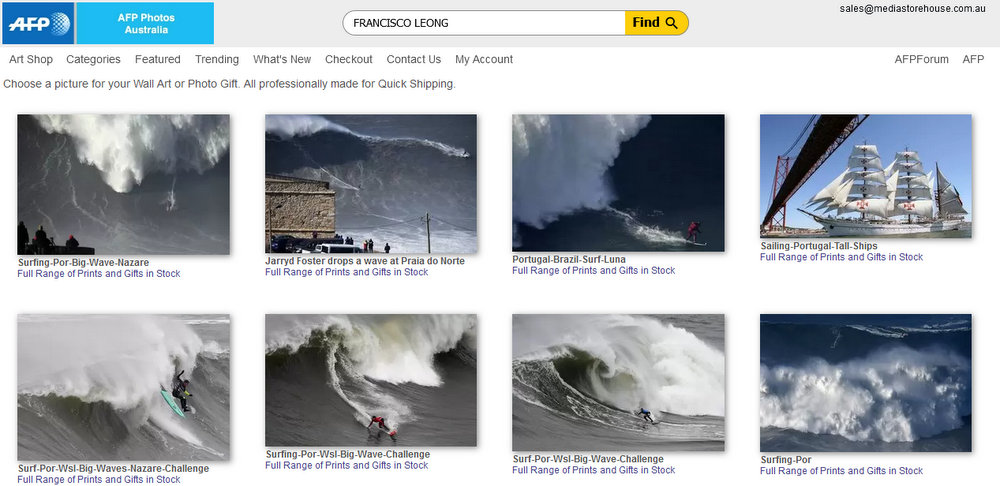Agence France-Press (AFP) is accused of using a ‘scorched-earth policy’ copyright defence against a Portuguese former staff photographer, by claiming news photos are not creative and do not deserve copyright protection.

Lisbon-based photographer, Francisco Leong, joined AFP as a stringer in 2005 and worked as a staff photographer from 2010 until 2019. When he joined AFP, he signed a contract that provided the news wire agency full rights of his pictures, and he’s now filed a lawsuit against AFP to recover his copyright.
In Australia signing a rights-grabbing contract may be the end of the dispute. In Portugal, however, the Journalist Statute and Code of Copyright provides ultimate rights to the creator of journalistic work. Leong believes this overrules the contract, meaning he retains his copyright over AFP, and he’s taken legal action against the news wire agency.
‘It is a rule that stands above any individual contract and states that the copyright belongs to a journalist, period… on my contract with AFP there was a clause saying the copyright was for AFP,’ Leong told Press Gazette. ‘I believe this violates the law and therefore is null and void.’
AFP launched a defence to the copyright claim that Leong’s union, Sindicato dos Jornalistas (SJ), describes as threatening ‘the livelihoods’ of photojournalists and journalists in European Union countries.
According to SJ, the agency argues news is in the public domain as it serves as a vehicle that ‘broadcasts to the public the set of facts that portray a particular daily event or news’. That includes news photos, which according to SJ, the AFP claims are ‘not creative, do not possess originality, and, as such, do not deserve legal protection.
It’s opened a can of worms questioning whether photojournalism is creative and possesses originality. Some straight news photography does ‘merely’ convey information, and it can be quite bland. But there is no denying talented photojournalists masterfully capture newsworthy moments, which many would consider to be creative and artistic. While this can easily be proven by rolling out pictures by legendary photographers like Sebastião Salgado, plenty of images in AFP’s archive show creativity and originality.
Leong’s photos of giant big wave surfing in Portugal are currently being sold by AFP as ‘wall art’ and photo gifts, with a 23×19-inch framed print costing $300. So someone at AFP seems to think Leong’s work is worth hanging on a wall.
As for news photography ‘possessing originality’ – even if 10 photographers line up to snap almost identical pictures, in Australia they are all protected by copyright law. It’s why media outlets and news agencies send photographers to the Olympics, even when they are confined to a photography zone where there are limited opportunities to capture unique angles. For instance, Australian Getty Images photographer Cameron Spencer shot a Walkley award-winning picture of Usain Bolt at the 2016 Rio Olympics, and German photographer Kai Oliver Pfaffenbach was nearby and captured a vastly similar World Press Photo Contest-winning image. The two pictures were shot in milliseconds of each other with similar technical settings, yet there hasn’t been a question of whether either image is original.
Debating whether news photos are creative or not seems like a moot point from a legal standpoint, as copyright law extends beyond only protecting ‘creative’ works. So long as a ‘creation’ is original – even if it’s purely informational – then it’s granted copyright protection.
SJ is concerned that if AFP successfully argues its ‘scorched-earth policy defence’, thtwould set precedent to allow anyone to pilfer news agency content on the grounds that it doesn’t possess originality or creativity.
‘…if the court rules in favour of AFP on this point, the business model of all news agencies will be put at risk, and thus the jobs of thousands of journalists. That is because if journalists lose protection over their work as it is not eligible for protection, logically their employers cannot claim protection over it either’.
The Press Gazette asked for AFP to comment on its defence, and it responded that Leong’s photos are not in the public domain because the rights belong to AFP.
SJ’s additionally claims that AFP is discriminatory, as all non-French staff are required to sign over their rights, while French staff retain copyright. Leong say for him it’s not about seeking compensation from AFP, but taking back control of the images he captured.
‘…I am claiming my copyright because AFP held my pictures after [I left] instead of sharing the profits with me same as the French photographers and keeping the money for themselves… I want justice. AFP line of defence is so absurd, so selfish, so short-sighted, that it’s hard to believe.’





https://www.afp.com/fr/lagence/communiques-de-presse/afp-scam-syndicats-de-journalistes-signent-des-accords-sur-les-droits-dauteur